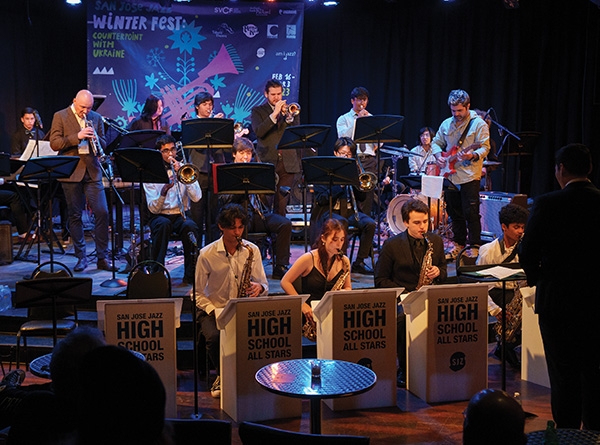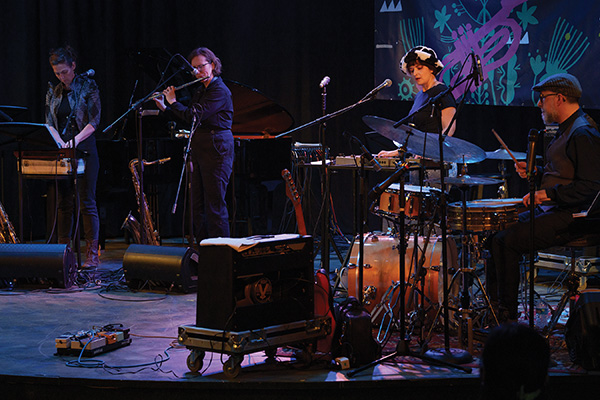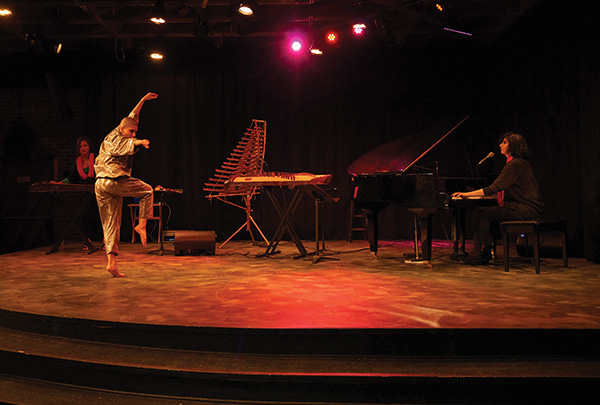| Columns Retired Columns & Blogs |
Never mind. (Tried to delete post but I don't see how.)

Jazz emerged from the African-American experience in the United States, so it is not surprising that it has been socially relevant since its earliest manifestations. Sonny Rollins put the matter succinctly: "jazz is protest music."
In 1923, Bessie Smith sang songs based on her experience of racism and sexism. In 1939, Billie Holiday recorded "Strange Fruit," a chilling song about a lynching. Charles Mingus's 1959 classic "Fables of Faubus" secured a permanent place in music history for the segregationist governor of Arkansas; thanks to Mingus, among jazz fans at least, the name "Orval Faubus" will ever be synonymous with bigotry.
But if social activism is nothing new in jazz, it has never been so prevalent as it is today. At some point in the new millennium, it began to feel like every new jazz album had to have at least one overtly political track. The reasons for this development may lie in the extreme political polarization of our society. The divisiveness of the Trump Era forced everyone, including artists, to choose sides.
But the ways jazz has woven itself into contemporary history go far beyond standoffs between progressives and conservatives. The Black Lives Matter movement galvanized jazz musicians of all races. Another social theme that has transcended partisanship is the pandemic. Human life changed for everyone in March 2020, but it devastated musicians.
Suddenly, they could not perform in public. They could not gather to practice, rehearse, or record without serious restrictions. An enormous amount of jazz music was conceived and composed during the isolation of lockdown. Much of that music has now been released, and it constitutes a unique documentation of a human crisis and a new human reality. Consider "Blessings in a Year of Exile," by Renee Rosnes, from her album Kinds of Love on the Smoke Sessions label. As the tune's title implies, some benefits came from the pandemic: What does not kill you makes you stronger.
Many other recent jazz projects have social themes that rise above all but the most insistent partisanship. Brian Landrus's fascinating album Red List, on Palmetto, has the subtitle, "Music Dedicated to the Preservation of Our Endangered Species." Not all socially engaged jazz comes from the United States. Pelagos, a solo album on ECM by the great Italian pianist Stefano Battaglia, is a work of devastating sadness. It meditates upon the boats full of refugees that have sunk on their way to European entry points for migrants. It deals with such universal human experiences as exile and the search for asylum and some sort of home.
In the famous eulogy "In Memory of W. B. Yeats," English poet W. H. Auden wrote, "Poetry makes nothing happen." The line is often quoted by those who believe that art exists only for art's sake—that it cannot function as a tool for social or political change. Clearly, the global jazz community is not ready to concede that music can make nothing happen.
An especially powerful example of how committed people can use jazz to build support for a cause took place in San Jose, California, in February and March of this year.
San Jose Jazz is a 501(c)(3) nonprofit organization that, in addition to sustaining a variety of educational programs, puts on two festivals a year: Summer Fest and Winter Fest. 2023's Winter Fest took on a new mission and subtitle: "Counterpoint with Ukraine." The festival coincided with the first anniversary of an event that shocked the civilized world: Russia's Ukraine invasion. Like all wars since Vietnam, that conflict is taking place on television. The world has witnessed Russia's murderous brutality and disregard for human life.
The executive director of San Jose Jazz, Brendan Rawson, explained how this year's festival came to embrace its theme: "I was at a European Jazz Network conference in Sofia, Bulgaria, in September of 2022. I heard some Ukrainian musicians who impressed me. When I started looking for information on Ukrainian jazz, it led me to Olga Bekenshtein. She was at the center of the Ukrainian scene. Olga and I started corresponding. She had started a festival in Kyiv in 2016 called 'Am I Jazz?' COVID forced her to take the festival virtual in 2020 and to postpone the 2021 edition until April of 2022. Then the invasion happened, in February of 2022, and of course the festival was canceled.
I had the idea to collaborate with Olga and to dedicate the 2023 edition of San Jose Jazz Winter Fest to Ukraine. The challenge was timing. Normally an idea like this would take a year to develop. But we only had a few months. We wanted to do it during the first anniversary of the war. We had the mindset that it was crucial to do it now. There were already rumblings out there that concerned us. There were officials in both political parties who were starting to question America's commitment to Ukraine. We had to move really quickly."
By February 2023, Rawson and his small staff, with Bekenshtein as co-curator, had put together an extraordinary 16-day program. Eight of Ukraine's leading jazz musicians plus a dancer were brought in. Most came directly from active war zones. In San Jose, they collaborated with American artists in many configurations on many unique projects. There were also fine art exhibits and films. This article is based on a five-day visit to the festival, February 22–26.

John Hollenbeck
American drummer and bandleader John Hollenbeck appeared in back-to-back concerts in the Tabard Theatre. Like all the venues in these five days of the festival, the Tabard is in downtown San Jose, the nerve center of Silicon Valley. It is a cozy, rather funky setting for music, with a bar and seating on two sides of a stage. To get there, you walk past the world headquarters of tech companies Adobe and Zoom.
In the first concert, Hollenbeck played drums with a high school all-star band and Ukrainian guests. The last song they played was an arrangement by Hollenbeck of a famous Ukrainian patriotic anthem from World War I, "Oh, the Red Viburnum in the Meadow." (Pink Floyd released a cover of this song in 2022, soon after the Russian invasion, with a vocal by Ukrainian rock star–turned-soldier Andriy Khlyvnyuk.)
Hollenbeck's interpretation of this war song was less martial than Pink Floyd's, more poignant and somber. He assembled his arrangement by gradually adding instruments from the orchestra until the piece became a huge, looming wall of sound, barely containing its turbulence. The high school players, under the direction of Oscar Pangilinan, executed Hollenbeck's challenging music admirably. The Ukrainian guests, all of whom were major presences throughout the festival, were trumpeter Yakiv Tsvietinskyi, vocalist Olesya Zdorovetska, and guitarist Igor Osypov. When the orchestra's commotion suddenly subsided, Osypov, left almost alone, took a searing solo. The performance was very moving—an international, multigenerational encounter with a 100-year-old iconic Ukrainian song with deep resonance for our present dark moment.
During the second half of the evening, Hollenbeck appeared with his new quartet, which he calls George. It is named for George Floyd, whose death in police custody in Minneapolis in May of 2020 was a flashpoint in the Black Lives Matter movement. The band has Anna Webber, Aurora Nealand, and Chiquita Magic on various reeds, keyboards, and vocals, with Hollenbeck on drums and piano. All four are fearlessly creative artists whose most impulsive effusions usually resolve into the precise (if unconventional) forms of Hollenbeck's compositions, which can flirt with chaos then stop on a dime. Hollenbeck's music is known for deadpan wit, and the George set included a wildly improbable song choice, Sonny Bono's "Bang Bang (My Baby Shot Me Down)." Hollenbeck bands can combine bent humor with serious purpose. The evening's focus on cross-cultural collaboration was sustained when Osypov and Zdorovetska joined forces with George. Everything intensified when dancer Alina Sokulska took the stage. She was born in Kyiv but is now based in Barcelona, Spain. She is both artist and athlete, capable of stunning undulations and maneuvers. As she reacted spontaneously to the improvised music of George, she was riveting.
Earlier in the day, Hollenbeck said, "It will be important tonight for people to see Ukrainians on the stage with everyone else and to see all that we have in common, and to see that what's happening to them is really happening to all of us."

Vân-Ánh Võ; Olesya Zdorovetska; Alina Sokulska
Sokulska made another appearance in the Tabard Theatre. She performed with Vân-Ánh Võ, a master of several traditional Vietnamese instruments including the 16-string dàn tranh (similar to a zither). Võ was joined by Olesya Zdorovetska on piano and vocals. Like so many events at the festival, this musical meeting was between two musicians who had never before played together. What they conceived in the moment—what they snatched from the air—was compelling. Võ's whining, quavering twangs were unfamiliar timbres, although perhaps you knew them from somewhere in your dreams. Zdorovetska, who is as much a performance artist as a musician, responded with her own wordless, passionate songs.
But the night belonged to Sokulska. The concert had a title: Magura. In Ukrainian mythology, Magura was a female deity of war. Sokulska's dance (according to Võ's introduction) was meant to embody three themes: "strength and resilience," "storm," and "hope." As Sokulska twisted, sped, and tumbled across the stage, sometimes in agonized contortions, it was impossible not to relive in your mind's eye imagery from Ukraine that the world has seen on television: The strength and the storm were powerful. The hope was always under duress, but it was there.

Never mind. (Tried to delete post but I don't see how.)